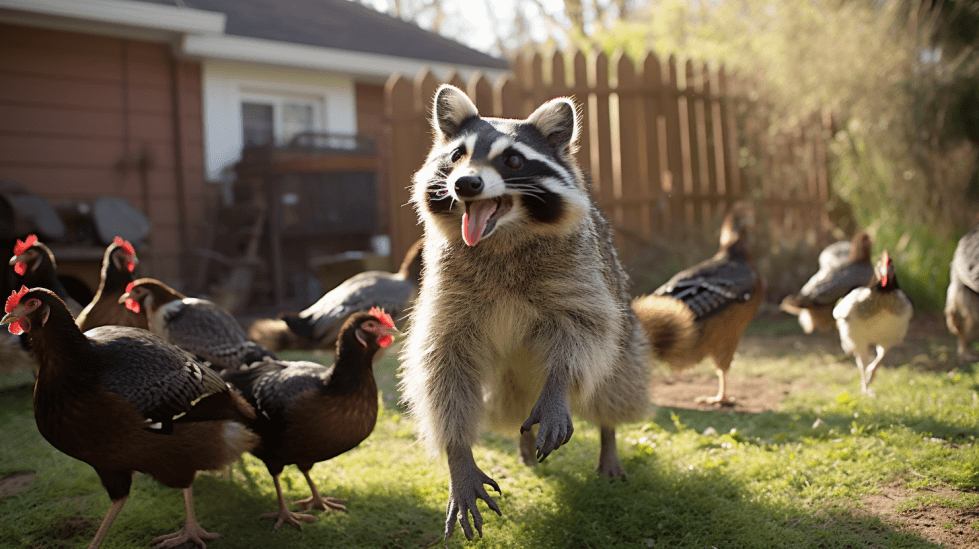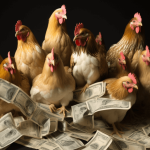How to Get Rid of a Raccoon Eating My Chickens
Raccoons are infamous for getting into mischief, and their adaptability to various environments makes them particularly troublesome for those trying to protect their chickens. As a chicken owner, I know firsthand how frustrating it can be to have raccoons preying on my flock. These clever, resourceful creatures are attracted to the prospect of an easy meal, and once they discover that your chickens are on the menu, they’ll keep coming back for more.

Protecting your chickens from raccoons is essential for maintaining a healthy flock and ensuring the safety of both your birds and other wildlife in the area. There is no one-size-fits-all solution to this problem, but I can recommend a variety of strategies and tips to prevent raccoon attacks, deter them from your property, and coexist with them when necessary. In some cases, seeking professional help can be the most efficient and effective course of action.
Key Takeaways
- Protecting chickens from raccoons involves prevention, deterrents, and coexistence strategies.
- Understanding raccoon behavior helps in creating effective solutions for safeguarding your flock.
- In certain situations, seeking professional help may be the best option for dealing with raccoon problems.
Identifying the Problem
As someone who has dealt with raccoons eating my chickens, I know how important it is to identify the problem early on. Urban areas have seen an increasing number of raccoon attacks on chicken coops as wild animals adapt to living in close proximity to humans. In this section, I’ll help you recognize the signs of raccoons, their tracks, and how their omnivorous nature makes them a serious threat to your chickens.
Raccoon Tracks
The first thing I look for when trying to identify if a wild raccoon has been near my chicken coop is their tracks. Raccoon tracks are quite distinct, with five toes on both their front and hind feet. Their hand-like front paws have long, slender fingers, while their hind feet are longer and wider. You may find these tracks near your coop or elsewhere in your property, especially near food sources or garbage.
Signs of Raccoons
Raccoon scat is another telltale sign of their presence. Raccoon droppings are usually dark, tubular, and may contain undigested food particles. I make it a point not to touch or handle the scat without proper protection, as it can carry dangerous diseases.
Another common sign of raccoons is the damage they can cause to your chicken coop. As an example, if my chickens disappear or are killed with their heads or limbs missing, it is a strong indicator of raccoon attacks. Raccoons may also leave torn chicken wire, opened latches, or dug out areas around the coop as they try to get in.
Omnivorous Animals: Raccoons
Finally, it’s important to understand why raccoons pose such a threat to our chickens. Being omnivorous animals, raccoons have a varied diet, which can include plants, fruits, eggs, and small animals like birds and rodents. Chickens, especially young ones and their eggs, are an attractive source of nutrition for these adaptable and intelligent creatures. This means that I need to constantly be on guard and take necessary precautions to protect my flock.
Why Raccoons Prey on Chickens

Easy Meal: Chickens
As someone who raises backyard chickens, I’m well aware that raccoons are a constant threat to my lovely birds. One reason for this is that chickens provide raccoons with an easy meal. Unlike other potential prey, chickens are typically confined within a coop or fenced area, making them easy targets for raccoons who are great climbers and diggers.
Chickens are also relatively defenseless creatures, especially when compared to other potential prey like rodents or rabbits. This further entices raccoons, as they can hunt chickens with little risk of injury. Additionally, chickens are known for their loud noises when frightened, which essentially serve as a dinner bell for raccoons seeking an easy meal.
Access to Food Sources
Raccoons are not only attracted to chickens themselves but also to the various food sources available around the chicken coop. Chicken feed, pet food, and even leftovers from my own meals can all serve as enticing treats for raccoons. In my experience, they have been particularly fond of:
- Chicken feed: Raccoons are known to be attracted to the smell and taste of chicken feed, often going to great lengths to access it.
- Pet food: If I ever leave pet food – whether it be cat food or dog food – outside and unsecured, raccoons are sure to find and devour it. This is especially problematic, as it can bring raccoons closer to my chickens.
- Leftovers: I’ve noticed that raccoons seem to enjoy raiding my compost bin for food scraps like fruit, vegetable, and even cooked food remnants.
Keeping raccoons away from these food sources is critical to protecting my chickens. This can be achieved by storing chicken feed and pet food in airtight containers, disposing of leftovers properly, and considering guard animals to keep raccoons at bay. Furthermore, securing the chicken coop by installing sturdy fencing and using scare tactics can also deter raccoons and keep my chickens safe.
Preventing Raccoon Attacks
Secure Your Chicken Coop
To keep raccoons out of your chicken coop, use sturdy materials like hardware cloth instead of simple chicken wire to cover any open areas, since raccoons can easily tear through it. Make sure you secure the coop door with a lock or bolt instead of relying on simple latches, as raccoons can learn to open them.
Ensuring Safety of Chicken Run
An effective way to protect your chicken run is to fortify it with wire mesh around the perimeter and on the top. This can deter raccoons from climbing over or digging under the enclosure. I also recommend burying the mesh at least a foot below ground level to increase security.
Managing Food and Water Sources
Raccoons are attracted to food, so removing any potential food sources from your property can discourage them from lingering near your coop. Keep trash cans, garbage cans, and garbage bins securely closed, pick up fallen fruit, and store poultry feed in airtight containers. You should also make sure to clean up any spilled food or water in the chicken run, as raccoons are opportunistic feeders.
Best Practices in Waste Management
Waste management is crucial for preventing raccoon attacks. Secure your compost pile with a lockable lid or fencing to keep raccoons from accessing it. Additionally, clean your hen house regularly to avoid attracting raccoons with the smell of droppings.
By following these steps, I’m confident that you can minimize the risk of raccoon attacks on your chickens. Remember, a secure coop and run, proper waste management, and addressing food and water sources are key to keeping your flock safe.
Raccoon Deterrents and Repellants
Using Cayenne Pepper
I’ve found that cayenne pepper is an effective raccoon deterrent. Raccoons despise the strong smell of cayenne pepper, so I simply mix one small canister with a bottle of hot sauce and a gallon of water. Then, I spray this solution all over my garden plants, bushes, and shrubs near the chicken coop. Remember to reapply after rainfall, as the solution can get washed away. If you’re worried about your plants, test the solution on a smaller area first to ensure it doesn’t harm them. This method can be found in this Family Handyman article.
Homemade Raccoon Repellants
Another approach I’ve tried to protect my chickens from raccoons involves homemade raccoon repellents:
- Ammonia-soaked rags: I soak rags in ammonia and place them around my chicken coop. The strong smell drives raccoons away. Be sure to keep the ammonia-soaked rags out of reach of children and pets, and ensure proper ventilation.
- Peppermint essential oil: Raccoons don’t like the smell of peppermint, so I use peppermint essential oil as a repellent. Mix a few drops with water in a spray bottle, and apply it around the perimeter of the coop.
Motion-Activated Lights
Raccoons are nocturnal and don’t like bright light. Therefore, I’ve installed motion-activated lights around my chicken coop. High-intensity LED or solar lights work well to deter raccoons. You can also consider using flashing lights, as they can startle and disorient raccoons, making them stay away from the area. Check out these recommended raccoon deterrents from this Pest Pointers source.
Power of Loud Noises
As raccoons get easily frightened by loud noises, I’ve taken advantage of this by using a radio near the chicken coop. A talk radio station is an excellent choice, as the sound of human voices drives raccoons away. Ensure that the radio doesn’t disturb your neighbors and avoid playing music, as raccoons may not find it as frightening as human voices.
By following the above strategies, I’ve managed to keep raccoons away from my chicken coop, preventing them from harming my chickens. Protecting our chickens should be a priority without causing unnecessary harm to raccoons. Always opt for humane methods to deter raccoons and ensure the safety of your chickens.
Living with Raccoons in Your Area
Coping with Raccoons in Urban and Rural Areas
As someone who has had encounters with raccoons in both urban and rural areas in the United States, I suggest implementing a few key strategies. Raccoons are nocturnal animals, so the first rule of thumb is to make sure your chickens are secured at night. Raccoon-proofing your chicken coop can be as simple as installing a secure latch or lock on the door. Remember, raccoons have nimble fingers, akin to a human hand, and can easily manipulate simple latches.
In rural settings, consider installing predator-resistant fencing to keep raccoons and other animals away. Another effective approach used in my experience is adding deterrents around the property, such as:
- Motion-activated sound or lights: When raccoons venture too close, this can scare them away.
- Odor repellents: Spraying a solution made of cayenne pepper or garlic near the chicken coop can help deter raccoons, as they are sensitive to strong smells.
Understanding Raccoon Behavior
Having lived with raccoons in North America, I can tell you that understanding their behavior is crucial when trying to protect your chickens. Here are some insights into raccoon behavior:
- Agility: Raccoons are excellent climbers and can easily scale trees or walls to access food sources.
- Intelligence: These creatures are known for their problem-solving skills, which means they can be persistent in their pursuit of a meal – in this case, your chickens.
- Territory: As they establish their territory, raccoons may mark it with scent, making it vital to keep your grounds as clean as possible to minimize the attraction.
By understanding raccoon behavior, you can take appropriate steps to prevent them from attacking your chickens. Raccoons are a natural part of the environment both in urban and rural areas, and learning to coexist with them involves protecting your chickens while doing your best to deter raccoons humanely.
Key Considerations in Dealing with Raccoon Problems
Handling Baby Raccoons
If you discover baby raccoons in your chicken coop, it’s important to approach the situation with extreme caution. While it may be tempting to simply remove them, I recommend contacting animal control instead. They have the expertise and equipment to safely relocate the animals without causing harm to them or the adult raccoons. Keep in mind that raccoons are protective of their young, so removing the babies yourself may provoke the adult raccoons to become aggressive.
Trapping and Relocating Raccoons Safely
When it comes to trapping and relocating raccoons, using a humane live animal trap is a good idea. Before setting up the trap, I suggest considering the following steps:
-
Choose the right live trap: Make sure to select a trap that is large enough to accommodate raccoons but has small enough openings to prevent injury to their paws or head. Remember, it’s essential to use a trap that is specifically designed for raccoons; using the wrong type of trap can be ineffective or even hazardous to the animal.
-
Placement of the trap: You’ll want to place the trap near the chicken coop or any area where raccoon activity has been observed. Be sure to set up the trap on a flat, stable surface and ensure it’s secured well to prevent it from tipping over.
-
Baiting the trap: Raccoons are attracted to many types of food, but the use of a sweet or strong-smelling bait, such as marshmallows or canned cat food, should be effective. Place a small amount of bait in the back of the trap to lure the raccoon inside.
-
Check the trap regularly: It’s important to check the trap at least once or twice a day to ensure the captured raccoon doesn’t suffer from stress or dehydration. Once the raccoon is trapped, relocate it to a safe distance (at least 10 miles away) from your property to prevent its return.
In addition to these steps, having a guard dog as a deterrent near the chicken coop might be a useful option to help protect your chickens. With these solutions in place, I hope you will be able to prevent raccoons from preying on your chickens and have a safe and secure environment for your flock.
Another Option: Seeking Professional Help

Sometimes, despite our best efforts, raccoons can still find a way to get to our chickens. They are excellent climbers and can easily bypass fences and obstacles. In such situations, seeking the help of a professional is a sensible option. I have found that contacting my local animal control service has proven to be quite effective in dealing with problematic raccoons.
When I call animal control, they usually send a trained professional to assess the situation and devise a plan to safely remove the raccoon from my property. They are equipped with specialized tools and knowledge to handle such situations efficiently, without causing any harm to the raccoon or my chickens.
In the meantime, I try to secure my chicken coop as best as I can, following tips from sources like Farmpertise and using hardware cloth or strong chain-link materials to reinforce the coop. It’s important to remain patient and keep a close eye on my chickens while waiting for the professional help to arrive.
Lastly, it’s worth mentioning that having a strong support network with fellow chicken keepers can make a difference. Sharing experiences and advice with others can be useful in preventing future raccoon attacks. Good luck in keeping your chickens safe from raccoons, and remember that professional help is just a phone call away when needed.
Frequently Asked Questions
How can I raccoon-proof my chicken coop?
To raccoon-proof your chicken coop, I would recommend securing all latches and doors with twine or padlocks to prevent raccoons from entering 1. Additionally, you should regularly inspect the coop for any weak spots in the walls or surroundings, as raccoons can exploit any gaps 2.
What are the signs of a raccoon attack on chickens?
Signs of a raccoon attack on chickens include dead or injured birds in your coop. Raccoons may also leave droppings or debris near their food sources 3. If you notice these signs, it’s crucial to act fast to protect your remaining chickens.
What improvements can be made to chicken wire to deter raccoons?
To deter raccoons, consider using hardware cloth instead of chicken wire, as it has smaller gaps and is more robust for protecting your coop. Additionally, you can bury a portion of the fencing underground to prevent raccoons from digging underneath it.
Are there any raccoon repellents safe for use around chickens?
There are several raccoon repellents available, but not all of them are safe for use around chickens. Some natural repellents, such as ammonia-soaked rags, can help deter raccoons, but you must be cautious not to expose your chickens to any harmful substances. Always follow the manufacturer’s instructions when using repellents.
How can I trap a raccoon that’s targeting my chickens?
Trapping a raccoon can be a helpful solution if it’s targeting your chickens. You can use live traps, but you should check local regulations to ensure you’re allowed to trap raccoons in your area. Also, make sure to place the trap in a safe location, away from your chickens, and use bait that attracts raccoons, such as marshmallows or canned fish.
Can chickens contract diseases from raccoon encounters?
Yes, chickens can contract diseases from raccoon encounters. Raccoons can carry various diseases, such as Salmonella, leptospirosis, and others 4. To minimize the risk of your chickens contracting these diseases, thoroughly clean any areas where raccoons have been present, discarding droppings and debris.








